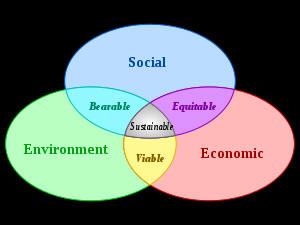
Sustainable Development
definizione da rivedere ... il soggetto non è l'ambiente ma l'uomo !
Sustainability, in a broad sense, is the capacity of maintaining a certain process or state. It is now most frequently used in connection with biological and human systems. In an ecological context, sustainability can be defined as the ability of an ecosystem to maintain ecological processes, functions, biodiversity and productivity into the future.
Sustainable development is a pattern of utilizing the existing natural and human resource capitals without decreasing their value for future utilizations. (see also development). The term was used by the Brundtland Commission which coined what has become the most often-quoted definition of sustainable development as development that "meets the needs of the present without compromising the ability of future generations to meet their own needs."
Sustainable development implies economic growth together with the protection of environmental quality, each reinforcing the other. Sustainable development is maintaining a delicate balance between the human need to improve lifestyles and preserving natural and cultural ecosystems. The field of sustainable development can be conceptually broken into three constituent parts: environmental sustainability, economic sustainability and sociopolitical sustainability. The essence of this form of development is a stable relationship between human activities and the natural world, which does not diminish the prospects for future generations to enjoy a quality of life at least as good as our own. Participatory democracy is a prerequisite for achieving sustainable development. (see participation)

Scheme of sustainable development: at the confluence of three constituent parts. (from wikipedia)
See:
----------
See also : Sustainability , Responsible tourism